Mike Doughty Discusses ‘Veronica Mars,’ His New ‘Covers’ Album + the Movie Star That Nearly Jumped Out His Window
At this point in his career, Mike Doughty should be a professor at some small Upstate New York liberal arts college. You can just imagine him sitting by the fire, grading papers with a small lap dog in repose by his feet.
The former lead singer and primary songwriter of the '90s alt-hip-hop band Soul Coughing -- who scored minor hits with ‘Super Bon Bon’ and ‘Circles’ -- might be the most affable, well-spoken rock star out there today. (He's the sort of guy Bono wishes he could be.) He’s had an interesting go at life after the ’90s, and in addition to launching a successful solo career and touring with the likes of Dave Matthews, he's written a highly literate and starkly personal memoir, ‘The Book of Drugs,’ in which he blasts his former Soul Coughing bandmates (quite hilariously) and speaks of his struggles with substance abuse.
On the heels of last year’s inventive covers album ‘The Flip Is Another Honey,’ which features re-imagined versions of songs like John Denver’s ‘Sunshine,’ Doughty has released one of the most meta albums of the year. On it, he "covers" a select number of his favorite Soul Coughing songs -- which he himself penned -- and the album’s title is from the School of Fiona Apple. It's called ‘Circles Super Bon Bon Sleepless How Many Cans? True Dreams of Wichita Monster Man Mr. Bitterness Maybe I'll Come Down St. Louise Is Listening I Miss the Girl Unmarked Helicopters The Idiot Kings So Far I Have Not Found the Science,’ or all of the songs on the album said at the same time.
In advance of his upcoming tour, Doughty recently phoned Diffuser.fm from the parking lot of a Cracker Barrel somewhere between Birmingham, Ala., and Atlanta and got philosophical about his new album. He also discussed 'Veronica Mars,' his feud with his former band mates and a certain unnamed movie start that almost jumped out of his window.
So you’re on tour?
I’m actually not on tour. I’m shilling my album at some indie record store conference in Atlanta.
We ran into you the other day on Greenpoint Avenue in Brooklyn. You were walking a tiny dog. Is that a sample of his little bark on your reworking of ‘Monster Man?'
[laughs] That is the first question everybody is asking me. That’s amazing. My dog is so f---ing cute, but no, I’m ashamed to say that I found dog samples online, and I’m faking the dog.
It sounded like an angry bark, and that’s a small dog.
Yeah, she has the occasional scared bark -- the occasional, "I’m way bigger than you think I am" bark, but it sounds pretty pathetic.
As late as this past March, you were still unready to say anything definitive about your Soul Coughing covers project. How difficult was it for you to revisit tunes that helped define a period of your life you seem interested more in forgetting than reliving?
I would say that the recordings define that period, whereas the songs are really kind of spiritual, ineffable things that sort of -- if I may be a hippie -- dwell in my spirit. They’re like ghosts; like knowing your way around an old neighborhood. What I stick to when I recorded the songs was me alone in a room in Brooklyn, or on the roof of my old place on the Lower East Side, or at this girlfriend of mine’s, or my friend’s porch in Pensacola, Florida, or all the innumerable places where I wrote the songs and who I was and what I was talking and thinking about when I wrote them.
So it’s a dichotomy for you, musically? The melodies are of the past, while the lyrics are where the meaning lies in the present for you?
You know, it doesn’t feel dichotomous; it feels absolutely natural to play these things. It’s abstract and and tactile at the same time, what it is to have the song in you. Relating to the songs has been nothing but beautiful, and when I’m in the song, it’s great, and there’s nothing that pierces the veil.
Not sure why this just came to us, but an artist like Elton John, who doesn’t write his own lyrics, seems to completely embody the song, get into the soul of the lyrics, even though he’s not the lyricist. Was there any of that feeling going on? Obviously, you wrote the lyrics …
Yeah, it’s weird because people like Nina Simone sang ‘I Think It’s Going to Rain Today,’ and you didn’t challenge it. Whereas I did write the songs and yet I had and have, to a certain degree, this angst about it.
You talk at length in your book about how you felt cheated by your Soul Coughing contract -- and the intense discontent you felt toward your former bandmates. Now that you’ve done this album, do you feel that you’re ready to make amends with them?
I mean … [pauses] I don’t know how to express it in a less convoluted way than to say, "This is just about songs, a guitar, and whatever these things are and trying to relate to them." And it is absolutely in the moment, you know, and it only relates to it; it doesn’t relate to the past or the future. It’s the songs.
So you don’t really care what your former bandmates think?
No.
Are they getting residuals from the sales of this album?
Oh yeah. Legally, they own songs that I wrote.
That’s sort of ridiculous.
I mean, I tend to agree with you, but -- I gotta be a hippie again -- this is a spiritual journey, man. Putting money aside and saying, "Who is this 26-year-old [Mike Doughty]?"
We like to think of this as more of "concept" album, in that you’re covering your own songs. Did you go about the project trying to think about where Mike Doughty was in the 1990s when he wrote them originally, or did you attempt to redefine them as 2013 Mike Doughty songs?
Yeah, but the answer is more inevitable than that. The song is. It just is. It’s not a question of making decisions ... [pauses] These are such confused answers that I’m trying to make!
It’s cool. We’re asking you philosophical questions at 11:30 in the morning.
[long pause] When you play the song, it is in the eternal present. You’re swimming around in the song. Relational questions should be immaterial to playing music. I’m not saying that a writer or a listener or whoever is going to have that in their consciousness -- that’s natural, that’s totally valid. When I play the song, it is simply the song.
So about the song choices. You are obviously not playing the complete works of Soul Coughing. You’re playing songs that you decided were songs that you wanted to revisit. Was it a conscious decision to play the two hits, for instance -- ‘Super Bon Bon’ and ‘Circles’?
‘Super Bon Bon,’ ‘Sleepless,’ ‘How Many Cans?,’ ‘Monster Man,’ and a bunch of others were songs that I really wanted to be club-bangers, because I was listening to bass DJs, house DJs, and hip-hop DJs, and I was hearing these huge beats. And when they were rendered on wax, they were disappointing to me, because they weren’t the records that I had envisioned. So I really wanted the chance to make those records. That is the happiest part for me; listening to ‘Sleepless’ and going, ‘That is f---ing huge and dope.’ [laughs] Like ‘Super Bon Bon’ is just a really simple, shot-down-the-middle heavy ride. And so that’s the one side. The rest I just liked. [laughs] It’s funny but I like the [original] recording of ‘Circles’; there are very few recordings that I listen to and I feel like, ‘This is what I meant.’ ‘Circles’ is one of them. I just like ‘Circles.’
Something that always bothered me about the original Soul Coughing recordings was that they sounded dated -- i.e. produced in the ’90s. These recordings sound timeless comparably. Who manned the control room?
When you’re in a band, you have to take into account the musicians you are with, and it’s a collective product. This [new album] is what I had in my brain; this is what I’d hoped for. I’m so happy that I actually made it. I did it with this hip-hop producer Good Goose. He’s worked with Mac Lethal and has an imprint on Tommy Boy. I met him through some friends, and he was asking me all these technical, geeky questions about [Doughty’s 2005 album] ‘Haughty Melodic.’ He was like, "Hey, man, what kind of compressor did you use?" And I was like, "I can’t f---ing remember, man." So I did it in collaboration with him at his place in Bed Stuy. He sat on a laptop in his living room, and I sang into a mic in his bedroom.
We noticed you crowd-funded this album. Did you feel like you owed the crowd-funders a better-than-average product? Do you worry at all that some of your crowd-funders might disapprove of the finished product?
Absolutely. Gratitude matters. Especially if you have an audience that has been loyal through a lot of weird s---, as mine has. So, oh my god do I want them to be happy! All the pledgers get the album [early]. Some people pledged to get a bonus acoustic album, and I’m sweating my ass off trying to make this thing good. [laughs] I’m having panic attacks about it. Every time I sit down with the hope of making an enduring piece of art. If I wanted to make substandard work for a living, I’d find a Soul Coughing cover band and play bars. But I want to be real. I want to make my life doing things that have a spiritual essence. So what I’m saying is, it wasn’t a worry that I’ve got to be good this time. They made this happen; I want them to be happy that they made it happen.
Your audience is almost bifurcated, in a way. You have your fans who followed your career throughout the ‘90s and into your solo career; and then you have just the people that discovered you as a solo artist.
I would say that half my audience comes from hearing ‘I Hear the Bells’ on ‘Veronica Mars.’ I swear to god. That was like a signature moment in my life, getting on ‘Veronica Mars.’ I’ve been on David Letterman; I had a song on ‘Grey’s Anatomy.’ I’ve been in some much bigger operations, but ‘Veronica Mars’ changed my life.
There’s actually a crowd-funded ‘Veronica Mars’ movie coming out now. Maybe you can get in on that soundtrack.
I know. I mean, I’m hoping they remember their boy Mike Doughty.
We’ve noticed that your voice has aged well over the years -- i.e. you actually sing a lot more. Do you enjoy playing and singing more than you used to?
One reason that I’m really proud of this album is that I got the vocals to be what I wanted them to. It is a huge part of how I feel about Soul Coughing recordings. I like what my voice is now, and I don’t and didn’t really like what it was like then.
Even the guitar sounds looser and crisper. A lot of this stuff was done slack-tuned? Is it dropped-D?
Dropped-C.
Oh yeah?
C-G-C-G-C-C, and sometimes the high C is tuned up to E. It comes out sounding really floppy.
It feels like the guitar parts are even more assertive. Like you weren’t pushed to get the right one.
When I got sober, I feel like I became a much better artist. I started working on all the stuff that I wanted to be good. I’ve worked on the vocals, I’ve worked on the guitar, and I just feel complete as a human being -- as an artist -- because it’s purely about the art, the music. There’s not an extracurricular activity that defines the entire enterprise.
What can we expect from you going forward? This seems like a watershed moment for you -- confronting your demons and getting what you meant on record.
I’m always just in the lab working on songs, working on beats, playing shows and trying to disconnect from myself and be in the music. So I’m just kind of the guy driving the car … I don’t really know where it’s going.
It’s funny you should say that, because on the Showtime series ‘Dexter,’ serial killer Dexter is constantly referring to the part of him that murders people as his "dark passenger."
Absolutely. It’s funny, I’m friends with Michael C. Hall [who portrays Dexter] -- he’s the only friend I’ve ever had that’s been on a massive billboard in Times Square. [laughs] I’m friends with Dave Matthews and s---, but a billboard in Times Square. I was like, "Wow, Mike’s really got something going on." [laughs]
He’s one of our favorite actors, hands down.
He’s, like, changed the culture; he’s iconic now. I remember being in my roommate’s graduation party and drinking beers with him.
Are you guys from the same town or something?
No, he went to the Tisch graduate acting program with a bunch of friends of mine, so there was a Tisch actor party. It was one time out of three at my house. Now, there’s a certain famous actor -- and I’m not going to tell you who he is -- but at the party, he crawled out onto the window ledge, like, five stories above 2nd Avenue, and it was like, "Holy s---! Get back inside!" And he was like, "No, I’m great! No, I’m great!" Finally, we dragged him back in. Whenever my friend who went to Tisch would refer to him, "Oh, I saw so-and-so," I’d be like, "Oh, the guy that almost jumped out my window." So eventually when I saw him in this huge movie, I was like, "That’s the guy that almost jumped out my window!"
You really can't give up the guy’s name?
I’m not going to give up a single detail because he … yeah, I’m not gonna tell you. [laughs]
More From Diffuser.fm









